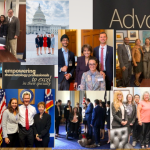On Sept. 23–25, the ACR will once again hold its annual Advocates for Arthritis fly-in event in Washington, D.C. Held in conjunction with the ACR’s Advocacy 101 course, the fly-in is a great way for members and their patients to learn about issues important to the practice of rheumatology and have the opportunity to actively meet with their congressional representatives.
“These events are extremely valuable,” says Angus Worthing, MD, chair of the ACR’s Government Affairs Committee (GAC), noting the events bring a wide variety of people from the rheumatic disease community together to Capitol Hill to have their voices heard.
“Patients, rheumatologists and rheumatology professionals, like nurses, physical therapists and practice managers, meet in groups with their elected officials and staff to tell them firsthand about the best ways to maximize our patients’ access to care and treatments, and to bolster rheumatology research and our workforce,” he says.
Events at a Glance
During the Advocates for Arthritis fly-in event, which is open to all ACR and ARHP members and their patients, participants are first briefed on specific legislative issues identified by the GAC as advocacy priorities, then join other attendees from their state or region to meet with their legislators and congressional staff to explain the issues and ask for support.
Fellows and program directors who want to dig deeper into advocacy work and learn the tricks of the trade are also encouraged to apply for the Advocacy 101 course. The three-day event opens with a one-day course devoted to teaching the basics of advocacy, the healthcare system and the specific advocacy work of the ACR. On the following days, participants join the greater Advocates for Arthritis Fly-in group for the legislative issues briefing and Hill meetings.
How to Make Sausage in D.C.
Christina Downey, MD, assistant professor of medicine, Department of Rheumatology, Loma Linda University Medical Center, Loma Linda, Calif., who is organizing the Advocacy 101 course this year, urges fellows and program directors to apply.
Now in its fourth year, the Advocacy 101 course allows participants to develop a broader understanding of the specific systems-based issues facing rheumatology via learning about advocacy, and provides the opportunity for attendees to create relationships with other ACR leaders and network with peers nationwide.
“I would strongly encourage all fellows to apply to come to D.C. to learn about advocacy from seasoned vets,” she says. “Advocacy is one way physicians can truly care for their patients on all levels, beyond the walls of the hospital or clinic.”
She also emphasized that advocacy work is not partisan politics—the focus is on the issues, not political ideology. “The job of the advocate is to help our representatives understand the issues we are facing in our offices and the issues our patients are facing,” she says.
Another benefit for fellows? Completing the course fulfills the “Systems-Based Practice” section of their fellowship.
2018 Advocacy Efforts
According to Dr. Worthing, potential issues that may be addressed at this year’s event include the increasing medical specialty workforce shortage and the Trump Administration’s proposals to lower drug prices by changing how patients obtain their medications.
It is hoped that strong advocacy efforts on these issues will mirror prior efforts that, for example, succeeded in preventing implementation of the proposed drastic cuts to the Medicare Part B infusion drug system and eliminated arbitrary caps on Medicare outpatient therapies.
But to succeed, members need to get involved. “There’s nothing as impactful as having a group of patients, doctors and rheumatology professionals in a lawmaker’s office talking about every facet of rheumatology care and the challenges that must be fixed,” Dr. Worthing says.
For members who cannot participate this year, he encourages them to get involved by visiting the ACR’s Legislative Action Center.
The application period for both events opens July 5. Online application will be available for any member who wants to participate in the Advocates for Arthritis fly-In event. Fellows and program directors will be receiving an email inviting them to apply for the Advocacy 101 program.
Mary Beth Nierengarten is a freelance medical journalist based in Minneapolis.


